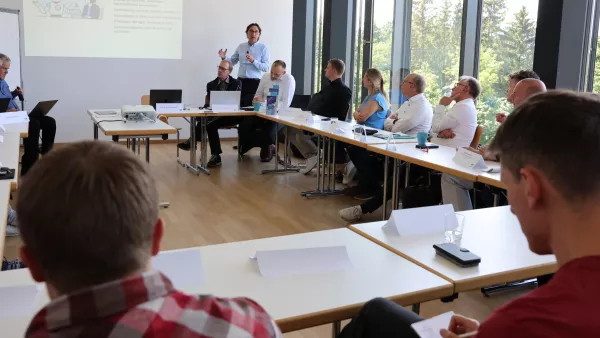
Leading representatives of regional social and healthcare institutions met at RWU Ravensburg-Weingarten University of Applied Sciences for the "AI in the social and healthcare sector" conference. The focus was on the meaningful and practical use of artificial intelligence (AI) to improve administrative, technical and planning processes as well as the professional qualification of staff at institutions and companies.
Interdisciplinary research
An interdisciplinary research team at RWU - consisting of Professor Dr. Hendrik Reismann, Professor Dr. Jörg Wendorff (both from the Faculty of Social Work, Health and Care), Professor Dr. Jürgen Friedl and Professor Dr. Markus Rager (both from the Department of Digital Business in the Faculty of Electrical Engineering and Computer Science) - is investigating how AI can contribute to increasing efficiency and improving quality in the social and healthcare sector. "We bring together different specialist skills and perspectives in this team," explains Markus Rager.
Different levels of maturity
The conference brought together 25 participants in management positions from various institutions. Moderated by Hendrik Reismann and Jörg Wendorff, they discussed technical, organizational and legal requirements for the use of AI. Numerous practical examples showed that institutions are in very different phases of AI implementation - from initial test runs to concrete applications such as voice assistants.
A common goal of all those involved: more efficient processes, especially in administration. However, more attention needs to be paid to specialist staff as a key user group of AI tools.
Practical relevance
The conference also served to better understand real practical needs and identify potential research priorities. Despite the size of the group, the discussions were focused and intensive. "We could develop many of the ideas from the panel together - some of them are already possible today," emphasized Jürgen Friedl.
Marvin Bitzer, a Master's student in Digital Business, provided insights into specific use cases. He presented use cases such as the automated updating of digital patient records via voice control or the automated retrieval of data from machines. The skills required for the use of AI were also discussed. The topic is playing an increasingly important role in social work teaching, for example: "We have added digitalization and AI to the curriculum and want to prepare our students well for dealing with AI," says Hendrik Reismann.
Data protection and financing
In addition to data protection issues, one topic in particular came to the fore: funding. Social institutions usually do not have specific budgets for AI or digitalization projects. The organizers were satisfied with how the conference went. The knowledge gained will now be systematically evaluated and used as a basis for possible collaborations.